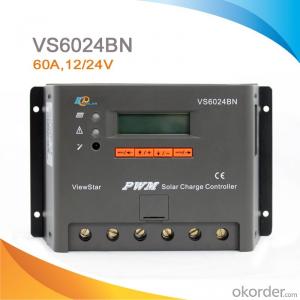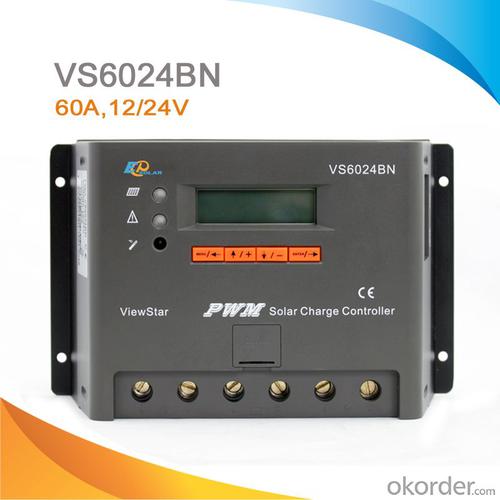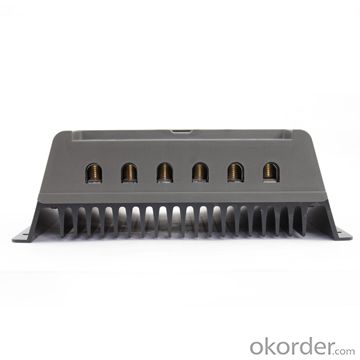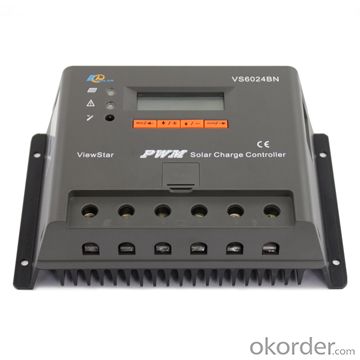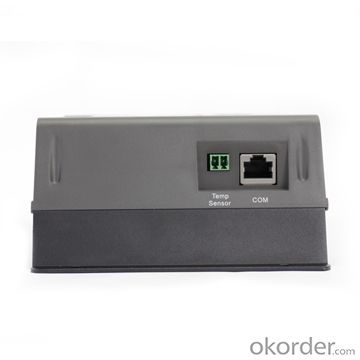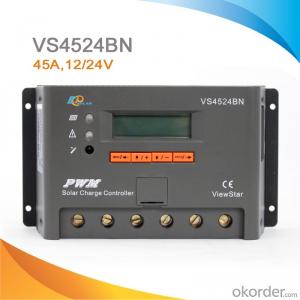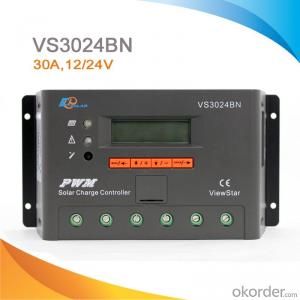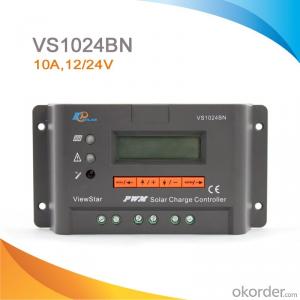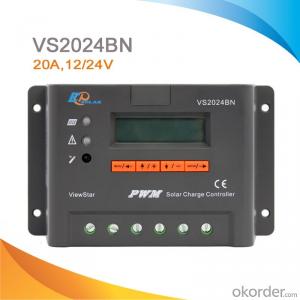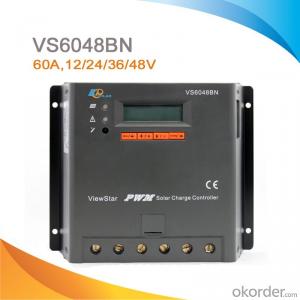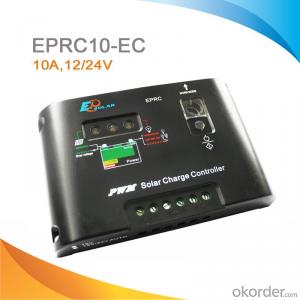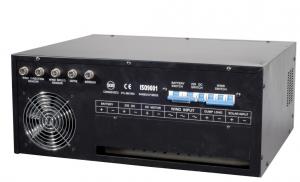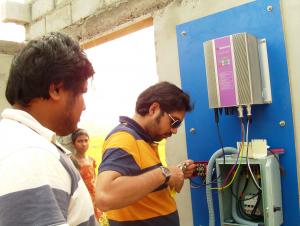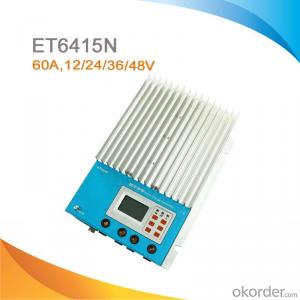Electric Fence Solar Powered Controllers - LCD/LED High Quality PWM Solar Street Light Charge Controller/Regulator with CE ROHS, 60A, 12V/24V, VS6024BN
OKorder Service Pledge
OKorder Financial Service
You Might Also Like
Descriptions:
A solar inverter, or PV inverter, or Solar converter, converts the variable direct current (DC) output of a photovoltaic (PV) solar panel into a utility frequency alternating current (AC) that can be fed into a commercial electrical grid or used by a local, off-grid electrical network. It is a critical BOS–component in a photovoltaic system, allowing the use of ordinary AC-powered equipment. Solar inverters have special functions adapted for use with photovoltaic arrays, including maximum power point tracking and anti-islanding protection.
Features:
·Excellent EMC design
·32 bit MCU with high speed
·High efficient Series PWM charging
·Four battery type options: Sealed, Gel, Flooded, and USER
·Intelligent lighting and timer control for solar lighting system
·12 bit A/D high-precision sampling to ensure accuracy
·Use MOSFET as electronic switch
·Full control parameters setting and modification, diversified load control mode
·Humanized design of browser interface, undertake every operating conveniently
·Temperature compensation
·Adopt graphics dot-matrix LCD screen and HMI (human-machine interface) with 4 buttons,integrated menu displaying and operation
Electronic Protections:
·PV short circuit protection
·PV reverse polarity protection
·Battery overcharge protection
·Battery over discharge protection
·Battery reverse polarity protection
·Load overload protection
·Load short circuit protection
·Overheating protection
Specification:
Model | VS1024BN | VS2024BN | VS3024BN | VS4524BN | VS6024BN |
Nominal system voltage | 12V/24V auto work | ||||
Rated battery current | 10A | 20A | 30A | 45A | 60A |
Rated load current | 10A | 20A | 30A | 45A | 60A |
Max. battery voltage | 32V | ||||
Equalize charging voltage | Sealed: 14.6V, Flooded: 14.8V, User-defined: 9~17V | ||||
Boost charging voltage | Gel: 14.2V, Sealed: 14.6V, Flooded: 14.8V, User-defined: 9~17V | ||||
Float charging voltage | Gel /Sealed /Flooded: 13.8V, User-defined: 9~17V | ||||
Low voltage reconnect voltage | Gel /Sealed /Flooded: 12.6V, User-defined: 9~17V | ||||
Low voltage disconnect voltage | Gel /Sealed /Flooded: 11.1V, User-defined: 9~17V | ||||
Self-consumption | ≤15mA(12V); ≤10mA(24V); ≤9mA(36V); ≤8mA(48V) | ||||
Grounding | Common negative | ||||
Temp. compensation | -3mV/°C/2V | ||||
Relative humidity | 10%~90% Non-condensation | ||||
Communication | RS485 / RJ45 interface | ||||
LCD temperature | -20°C ~ +70°C | ||||
Working temperature | -25°C ~ +55°C | ||||
Humidity | ≤95% N.C. | ||||
Enclosure | IP30 | ||||
Overall dimension | 162x85x40mm | 162x100x50mm | 200x103x58mm | 201x109x59mm | 205x129x67mm |
Terminals | 4mm2 | 10mm2 | 16mm2 | 35mm2 | 35mm2 |
Net weight | 0.2kg | 0.4kg | 0.7kg | 0.9kg | 1.3kg |
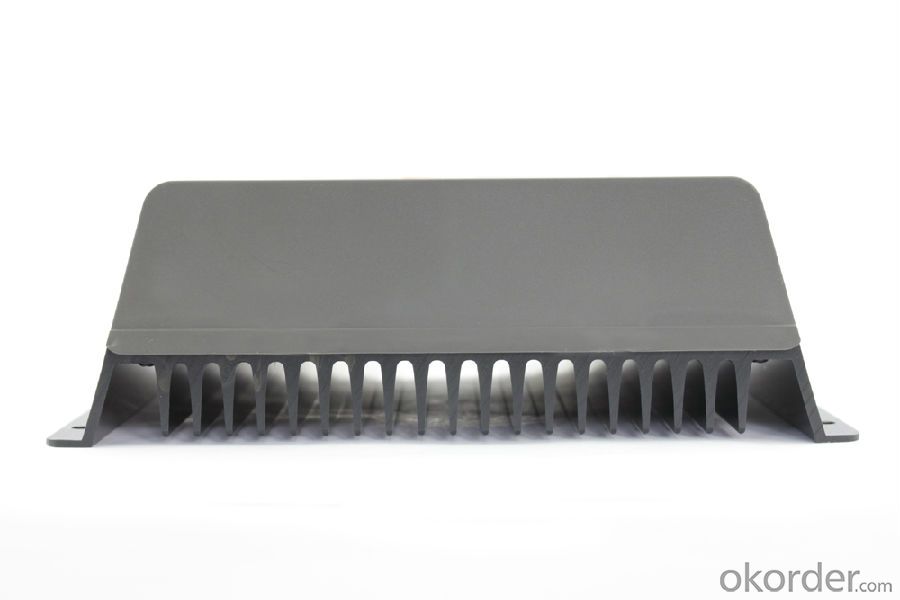
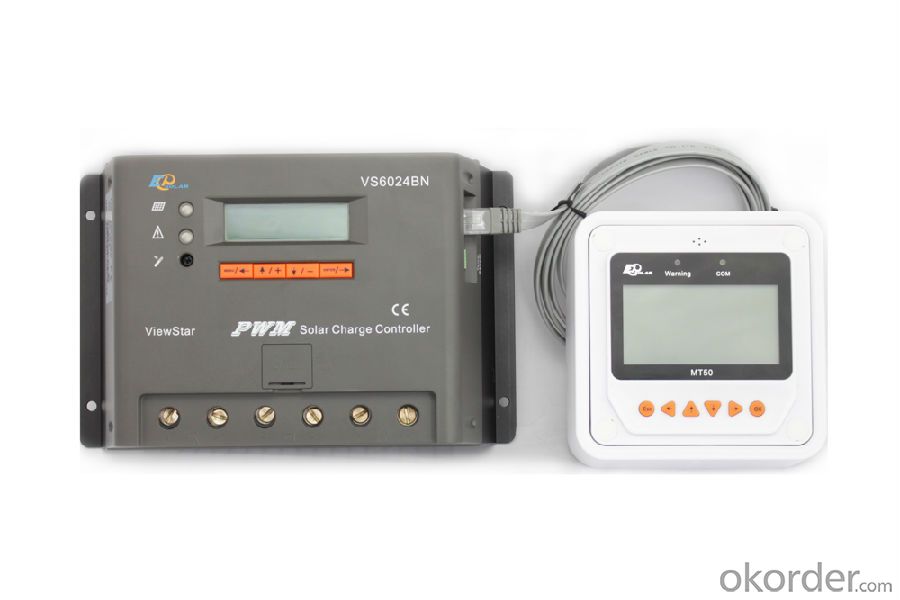
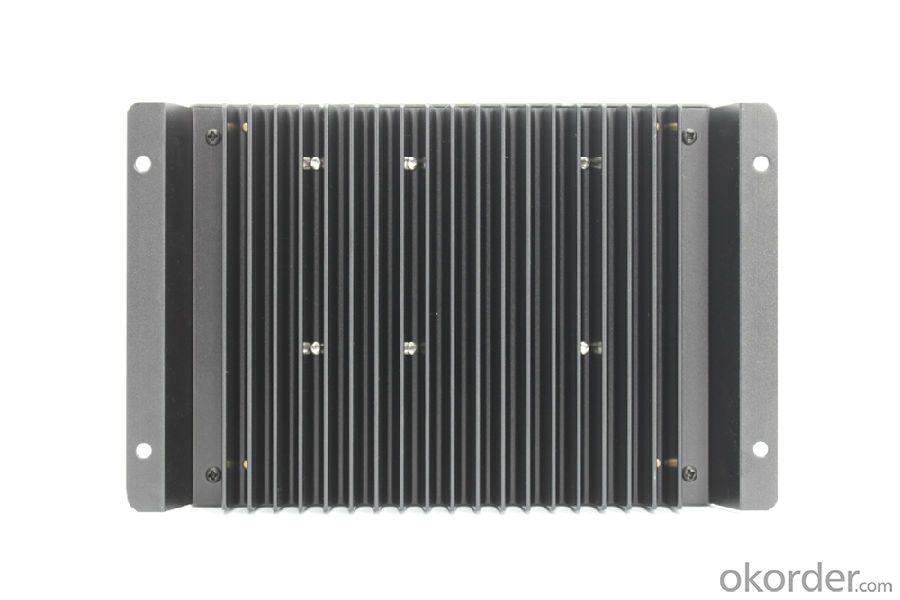
- Q: Can a solar controller be used in a commercial solar power system?
- The utilization of a solar controller in a commercial solar power system is indeed possible. Referred to as a charge controller as well, a solar controller serves as an integral part of any solar power system. Its primary objective is to regulate and manage the flow of electric current from the solar panels to either the batteries or the power grid. In commercial solar power systems, the solar controller holds significant importance in guaranteeing the utmost performance and efficiency of the system. It effectively prevents the batteries from becoming overcharged, which can lead to damage and a decrease in their lifespan. Additionally, it safeguards against reverse current flow from the batteries to the solar panels during periods of limited or no sunlight. By skillfully handling the charging process, a solar controller maximizes the amount of energy obtained from the solar panels and ensures its efficient storage for future usage. This aspect is especially critical in commercial solar power systems where a substantial amount of energy is generated and stored. Moreover, certain advanced solar controllers possess additional features, including monitoring the system's performance, enabling remote monitoring and control, and providing protection against overvoltage, short-circuiting, and overheating. All in all, a solar controller is an indispensable component within a commercial solar power system as it optimizes energy production and storage while safeguarding the durability of the system's batteries.
- Q: What is the operating temperature range of a solar controller?
- The operating temperature range of a solar controller typically varies depending on the specific model and manufacturer. However, most solar controllers are designed to operate within a temperature range of -20°C to 60°C (-4°F to 140°F). These temperature limits ensure that the controller can effectively regulate the flow of electricity and manage the charging and discharging of the battery in various weather conditions. It is important to note that extreme temperatures, especially on the higher end of the range, may affect the efficiency and performance of the controller, so it is advisable to install the controller in a well-ventilated, shaded area to minimize any potential heat-related issues.
- Q: What is the input voltage range of a solar controller?
- The input voltage range of a solar controller typically depends on the specific model and design, but it is commonly between 12V and 48V.
- Q: What is the difference between a solar controller and a solar regulator?
- The terms "solar controller" and "solar regulator" can be used interchangeably to describe the device that regulates and controls the charging process of a solar panel system. Their main purpose is to prevent the batteries from overcharging by regulating the current flow from the solar panels. This is crucial for maintaining the batteries' health and lifespan. Typically, solar controllers or regulators are installed between the solar panels and the battery bank in a solar power system. They are available in various types and sizes, depending on the specific application and system requirements. Common types include PWM controllers and MPPT controllers. PWM controllers are simpler and less expensive, while MPPT controllers are more advanced and efficient in maximizing the power output from the solar panels. In essence, whether referred to as a "solar controller" or "solar regulator," both terms describe the same device responsible for managing and controlling the charging process in a solar panel system. Their goal is to ensure optimal performance and battery health.
- Q: How does a solar controller handle voltage fluctuations from the solar panels?
- A solar controller, also known as a charge controller, is utilized in solar power systems to regulate and control the electricity flow between the solar panels and the battery bank. One of its primary functions is to manage voltage fluctuations originating from the solar panels. When sunlight strikes the panels, it generates direct current (DC) electricity. However, the voltage output of the panels can vary due to factors like sunlight intensity, temperature, and shading. These fluctuations in voltage can be detrimental to the battery bank as they have the potential to either overcharge or undercharge the batteries, leading to reduced performance and lifespan. In order to address voltage fluctuations, a solar controller incorporates a technique called Maximum Power Point Tracking (MPPT). MPPT is a technology that ensures the panels operate at their maximum power output, regardless of voltage fluctuations. The solar controller continually monitors the voltage and current produced by the solar panels and tracks the optimal operating point, where the panels generate the most power. By consistently adjusting the electrical load on the panels, the MPPT algorithm guarantees that the panels operate at their maximum power output, even in the presence of voltage fluctuations. To accomplish this, the solar controller dynamically adjusts the resistance across the panels, thereby optimizing the voltage and current levels. This enables the solar panels to consistently supply a stable and optimal voltage to the battery bank, irrespective of any environmental fluctuations. Additionally, solar controllers incorporate several protective features alongside MPPT to handle voltage fluctuations. These features include overcharge protection, which prevents the batteries from becoming overcharged when the panels produce excessive voltage, and over-discharge protection, which prevents the batteries from being excessively discharged when the panels produce insufficient voltage. Overall, a solar controller plays a vital role in managing voltage fluctuations originating from the solar panels. By utilizing MPPT technology and incorporating protective features, it ensures that the solar power system operates efficiently, maximizing the power output from the panels while safeguarding the battery bank from damage caused by voltage fluctuations.
- Q: What is the maximum current a solar controller can handle?
- The maximum current a solar controller can handle depends on its specifications and design. It can range from a few amps to several hundred amps, depending on the model and purpose of the solar controller.
- Q: What is the role of a solar controller in preventing electrical surges in the solar panel system?
- The role of a solar controller in preventing electrical surges in the solar panel system is to regulate and control the flow of electricity between the solar panels and the batteries or the grid. It ensures that the voltage and current levels are kept within safe limits, preventing any sudden spikes or surges that may damage the system components. The solar controller also provides protection against overcharging or over-discharging of batteries, safeguarding the overall system from potential electrical surges.
- Q: Can a solar controller be used with solar-powered remote monitoring systems?
- Yes, a solar controller can be used with solar-powered remote monitoring systems. A solar controller is designed to regulate the charging and discharging of batteries in a solar power system. It ensures that the batteries are charged efficiently and protects them from overcharging or discharging. Therefore, it can effectively control the solar power supply to remote monitoring systems, ensuring reliable and continuous operation.
- Q: How does a solar controller handle fluctuations in solar irradiance?
- A solar controller handles fluctuations in solar irradiance by continuously monitoring the incoming solar energy and adjusting the output accordingly. It regulates the flow of electricity from the solar panels to the connected batteries or grid, ensuring a stable and optimal charging process. When there are fluctuations in solar irradiance, the controller modulates the charging voltage and current to maintain a consistent and efficient energy transfer, thereby protecting the batteries and optimizing the overall system performance.
- Q: Can a solar controller be used with solar-powered data centers?
- Yes, a solar controller can be used with solar-powered data centers. A solar controller is a device that manages and regulates the charging and discharging of batteries in a solar power system. It ensures that the solar panels are operating efficiently and the batteries are maintained at optimal levels. In the context of solar-powered data centers, a solar controller can be used to control and optimize the flow of solar energy to power the data center's operations while also managing battery backup systems.
Send your message to us
Electric Fence Solar Powered Controllers - LCD/LED High Quality PWM Solar Street Light Charge Controller/Regulator with CE ROHS, 60A, 12V/24V, VS6024BN
OKorder Service Pledge
OKorder Financial Service
Similar products
Hot products
Hot Searches
Related keywords
